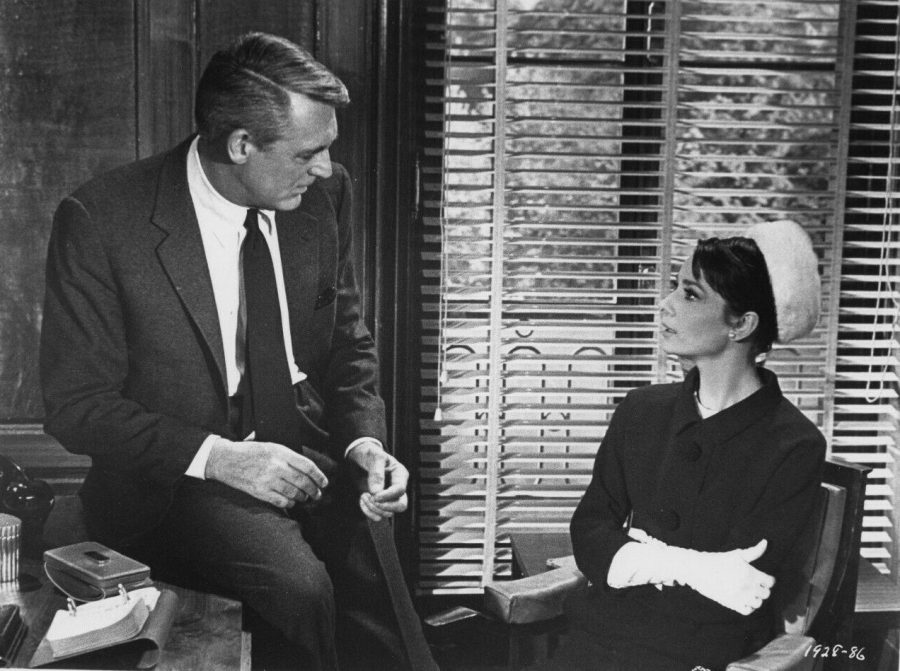Charade may be a classic, but it doesn’t disappoint
Even while understanding the film culture in the early sixties, it is still jaw dropping to watch Charade, of 1963, and only see two women in the entirety of the film. Nevertheless, the movie’s satire and development of the plot as a whole makes the movie worth watching.
Charade follows Regina Lampert, played by Audrey Hepburn, after the murder of her husband, and the mystery of quarter of a million dollars he had stolen from the United States government. She meets Peter Joshua, played by Cary Grant, who has no shortage of identities and secrets up his sleeve.
The audience gets attached to Regina’s story through her complex blend of dry humor and grace throughout the film. She quickly throws off the idea of an average French woman in the sixties, as her first scene is her traveling alone in Sweden and talking of a divorce to her friend Sylvie, played by Dominique Minot.
Hepburn’s character is the classic golden girl of the silver screen. Though this is not dissimilar for her characters, as she usually plays the pretty young woman who comes from money, but isn’t afraid to voice her feelings and opinions, such as in Roman Holiday or Sabrina.
Regina’s characterization with a feminist approach could be described as complex, but in reality was just confusing. At the start of the movie she was seriously debating divorce and starting work again, it was later revealed Regina made no financial decisions in the relationship, and was dumbfounded in multiple scenes throughout the movie. However, this wasn’t an uncommon position for women to be found in at this time, and Regina not being able to trust or escape her husband has a very different message to the audience watching in modern times.
While Regina’s husband was only shown once, during his brief death scene, there are plenty of other men that invade her life, adding towards the plot of the film. Herman Scobie, played by George Kennedy, Leopold Gideon played by Ned Glass, and Tex Penthallow played by James Coburn, were all war veterans, who stole the 250,000 dollars together with Regina’s husband and planned to share it, but he stole it for himself. Since his death, the three act as the film’s main antagonist for the majority of the film.
Along with other elements, the trio adds a comedic aspect to the supposed ‘mystery/thriller’ film. The only thing keeping the audience on their toes was trying to figure out which of the three was the most stupid.
One humorous moment was during Mr. Lampert’s funeral, and the introduction of the criminal trio. The way director Stanley Donen structured the scene is bizarre, viewers are confused on whether or not it’s okay to laugh, all while trying to determine what’s happening.
Charade was constantly playing with the emotions of the film through its sound. In several scenes, including the funeral scene, it’s complete silence, forcing the audience to pay close attention to what’s happening in the present scene, and being able to convey emotion of other characters through the volume of certain events. While the lack of a score made some scenes more boring than it with one, it certainly reminds the audience of the time period the movie was made in, making you enjoy the classic, ‘old timey,’ films.
Unfortunately, a so-called classic movie is far from today’s standards. Along with CIA administrator Hamilton Bartholomew, played by Walter Mathau, and Police Inspector Grandpierre, played by Jacques Marin, every male character tries to overpower, manipulate, and simply mansplain simple ideas to Hepburn’s character. Despite the plot of criminals, Regina’s relationship with Peter is not only toxic, but a direct factor to much of the conflict and danger in her life that he claims to be saving her from.
The relationship of the character’s was generally uncomfortable to watch, mostly due to the fact that Grant’s character revealed a new name to her and the audience every half an hour in the movie. It became less and less surprising the more Peter lied to Regina, and comforted her hurt from betrayal with charm and silly comedy acts to shift the tone of the scene. Even with contribution to the plot, it was still a betrayal to feminism everywhere, despite Regina’s sarcastic remarks against her own choices to keep trusting him.
Most of Regina’s relationships with her male counterparts were hard to watch, giving off an often creepy and unsettling feel. It seemed like Regina was only a pawn for most of the scenes, despite her efforts to remain in control.
Hepburn can’t be praised enough for her role in Charade. While she’s most known for her more popular movies, like Breakfast at Tiffany’s, her performance never adds to bring a special element of eloquence to a movie. Besides Regina’s friend Sylvie, who appears for all of ten minutes, Hepburn is the woman with lines in the entire film. As the main character and central focus of the plot, it’s a tough job to balance herself with the rest of the characters, whose goals revolve around subjugating Regina to find the money they think she has.
Unsurprisingly, she brings the perfect amount of emotions and prestige to her character. Hepburn’s ability to to truly become a character is something that few actors have the ability to pull off. Regina’s classic look contrasts largely with her personality, as in this golden age of Hollywood, most female characters are often submissive and quiet. Regina is not. She is not afraid to speak her mind or insert herself into the investigation surrounding her husband’s death and the missing cash.
However, despite being the main character, you wouldn’t know it from the way she’s written. As more character’s get introduced, Regina becomes more of a pawn in the story, and less of what woman the audience saw breaking stereotypes in the beginning of the movie.
Charade was a pristine example of what lack of gender representation can do to hurt the overall quality of the film. With entertainment from certain characterization and subplots, it was a movie to watch for purely entertainment purposes.
Your donation will support the student journalists of Cape Coral High School. Your contribution will allow us to purchase equipment and cover our annual website hosting costs.








